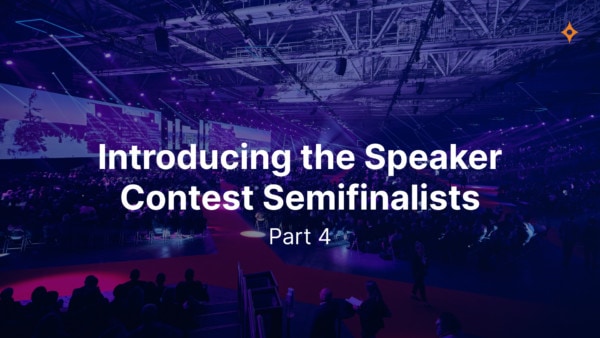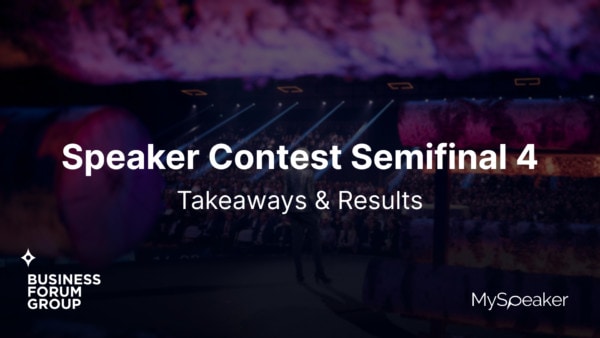16Mar2023
This morning we had our third semifinal session of the Speaker Contest, hosted together with our official partner MySpeaker. This time we saw 5 wonderful speeches on innovation, leadership, and sustainability. Read on to find out the key takeaways from these speeches and finally, who moved on to the final round of the Speaker Contest!
Ritu G. Mehrish – Leader’s Block – The Opposite of Potential
“The biggest reason for unproductive leaders is something that nobody wants to talk about and has no name”, Mehrish provocatively told the audience. It happens when leaders feel unmotivated, disengaged and find no reason for it. In order to discuss this phenomenon further, first she named it the “leader’s block”, in analogy to a writer’s block.
Mehrish admitted that she had experienced this condition herself. She remembered when her manager called her in and told her that some people in her team wanted to move to a different area. What followed was one of the most difficult times in her career, and it took her more than six months to recover from it.
This painful experience led her to further investigate the topic. She found out that there are more than 10 common triggers for a leader’s block, ranging from an ineffective supervisor, a toxic work culture, resistance to change, and external factors like the pandemic.
According to Mehrish, if a leader’s block is not treated, it may cause anxiety, burnout, and even depression. Furthermore, it has a ripple effect on the team, which becomes unproductive, less creative, and unmotivated.
The main difficulty in dealing with a leader’s block is that people don’t want to admit it, fearing they will be tagged as a failure. But once they acknowledge that something is wrong, five approaches can help them to get through it. During her keynote, Mehrish discussed two of them:
Let it go. Leaders have a bias for action and want to be in control. When experiencing a block, they tend to act in a reactive way and make hasty decisions, like quit, sell out, or downsize. “Don’t make hasty decisions”, advised Mehrish.
Seek out feedback. Many leaders say that people around them saw signs of a block before they could realize it. Reaching out to two or three people that they trust and asking them if they noticed a change in their behavior can help leaders become aware of the external impact they have on other people and take early action.
Finally, Mehrish stated that organizations have to play a bigger role in helping people that are suffering from the condition. “Let’s move the conversation about leader’s block from behind closed doors to open corridors,” she concluded.
Julien LeBlanc – Getting to Thank You (Kiitos) – The Questions are the Answers!
In his keynote presentation, Julian Le Blanc challenged us to imagine a world in which all leaders would strive to get a thank you. These “thank yous” would come in different forms: “thank you for making me a better leader,” “Thank you for challenging me,” or “Thank you for making the world around me a better place” were some examples he detailed.
In order to elicit these tokens of appreciation, LeBlanc argued that you should ask yourself two questions: Why would anyone want to be led by you? Do you make it easy for others to say thank you for your leadership?
In order to answer the first question, you can start by achieving self-awareness through 360 feedback led by peer review or by asking yourself, “how can I help?”. You can also use the Platinum rule (treat others as they want to be treated), instead of the Golden rule (treat others the way you want to be treated). Lastly, leaders need to focus on consistency.
To ensure that the answer to the second question is a resounding yes, leaders should focus on clarity in their communication first. A good way of making sure all communication is clear is by asking for the elevator pitch six months into the project.
Secondly, leaders should strive to promote intrapreneurship, or “freedom in a framework. “Set parameters and allow people to work their magic,” LeBlanc suggested. Lastly, focus on developing cornerstone habits. According to LeBlanc, it takes 66 days to successfully set a habit. “As Jerry Seinfeld said,” LeBlanc elaborated “Don’t break the chain.” Set a habit and do it every day.
In closing, LeBlanc challenged us to take the “Thank you Challenge” and spend 5 minutes a day reflecting on the two questions he posed. Commit to the challenge for 66 days. Will you join us?
Svein Harald Røine – Ignite them or lose them
Røine began his presentation by recalling a time when he was climbing on a mountain with his six-year-old son. As they made it to the top, his son climbed on the top of the cairn, opened his arms up into the air, and shouted, “TA-DA!” in excitement. “The most important human need, after we have covered our basic need for survival, is to be seen, to be appreciated, to be acknowledged,” explained Røine.
But as we grow, it is no longer cool to shout TA-DA when you are proud of something, so we keep these exclamations to ourselves. “It is a leader’s duty to see other people’s ta-das,” Røine remarked. The reason is that if you don’t ignite other people’s enthusiasm, they will leave. To back up this idea, he showed a 2017 study in which 63% of the respondents said they would probably quit their jobs if they were not acknowledged. The statistic was up from 51% in 2012. This increase could be explained by the larger proportion of millennials in the workforce (in the 2017 survey, the percentage of millennials answering they would probably leave if they were not appreciated or seen was 66%).
Røine described two tools to prevent people from quitting.
Speed praising. According to Røine, praising is a skill, and it has to be practiced. As an example of how to train this ability, he described a workshop with 30 leaders who were asked to praise each other. Standing in two lines, after 4 or 5 people had complimented the rest of the group, the participants started looking each other in the eyes and talking from the heart. “I recommend that all managers put speed praise on their agendas on a regular basis.”
Domino praising. In every management meeting, the CEO or chairperson asks the managers to mention one person in their team that has done something outstanding since the last time they gathered. And when the meeting is over, the CEO goes and personally praises each person that was mentioned. This tool helps to build a praising culture in the organization.
Finally, Røine reminded the audience that we all have a pilot flame inside. “As a leader, you can ignite that pilot flame, make it shine big, or blow it out. What will you do?”
Anu Ruul – Innovation based on sustainable greed
Anu Ruul’s presentation centered on the idea of innovation based on sustainable greed. She kicked off her presentation by asking, “What is innovation”? The answer: using new skills, tech, and knowledge to create new value.
Ruul challenged us to foster innovation in a way that takes our planet into account. “We never considered how our planet is feeling,” she stated. However, she argued that people today are more demanding when it comes to sustainability. They look to support companies with sustainable policies, and 80% value moral leadership. If you take the four keys to innovation (technology, processes, people, and data) and add the environment, your company will outcompete any competitors.
A critical factor for applying sustainability to companies is to reduce waste. Ruul claimed that the best way to do this is to collect even more data before the launch. When coming up with a new product, ask yourself, “Is this problem real? Is it worth solving? Is this solution the correct one?” Make sure to carry out many experiments before sinking valuable resources into a product.
Being able to achieve innovation based on sustainable greed requires two things, according to Ruul. The first is strong leadership skills for the culture. The second is strong innovation skills for the experiments.
“Responsibility arises when we have a choice. Homo sapiens are now responsible for every living species on the planet,” she said in closing.
And our winner..
Tobias Sturesson – How to Overcome Your Company’s Greatest Culture Challenges
Sturesson started his keynote with a personal and moving story about how he grew up in a Christian community that became a religious cult with a destructive culture. As he witnessed the terrible consequences for his mother and himself, he wondered how an organization that seemed to be driven by a noble mission turned into something so toxic. “This question has haunted and driven me as I left that community and dedicated my professional life to become an advocate for a healthy culture”, he admitted.
Sturesson stated that toxic cultures breed distrust, division, disengagement, dysfunction, and can destroy company’s values and wreck people’s lives. His winning speech discussed how to overcome these challenges and build a healthy and resilient culture. The secret lies in building 4 leadership habits instead of concentrating all the effort on a change initiative that is done occasionally. To find out what these 4 habits are, don’t miss Sturesson’s speech on the 10th of May on our Speaker Contest final – either live in Helsinki, or on our live stream online!


